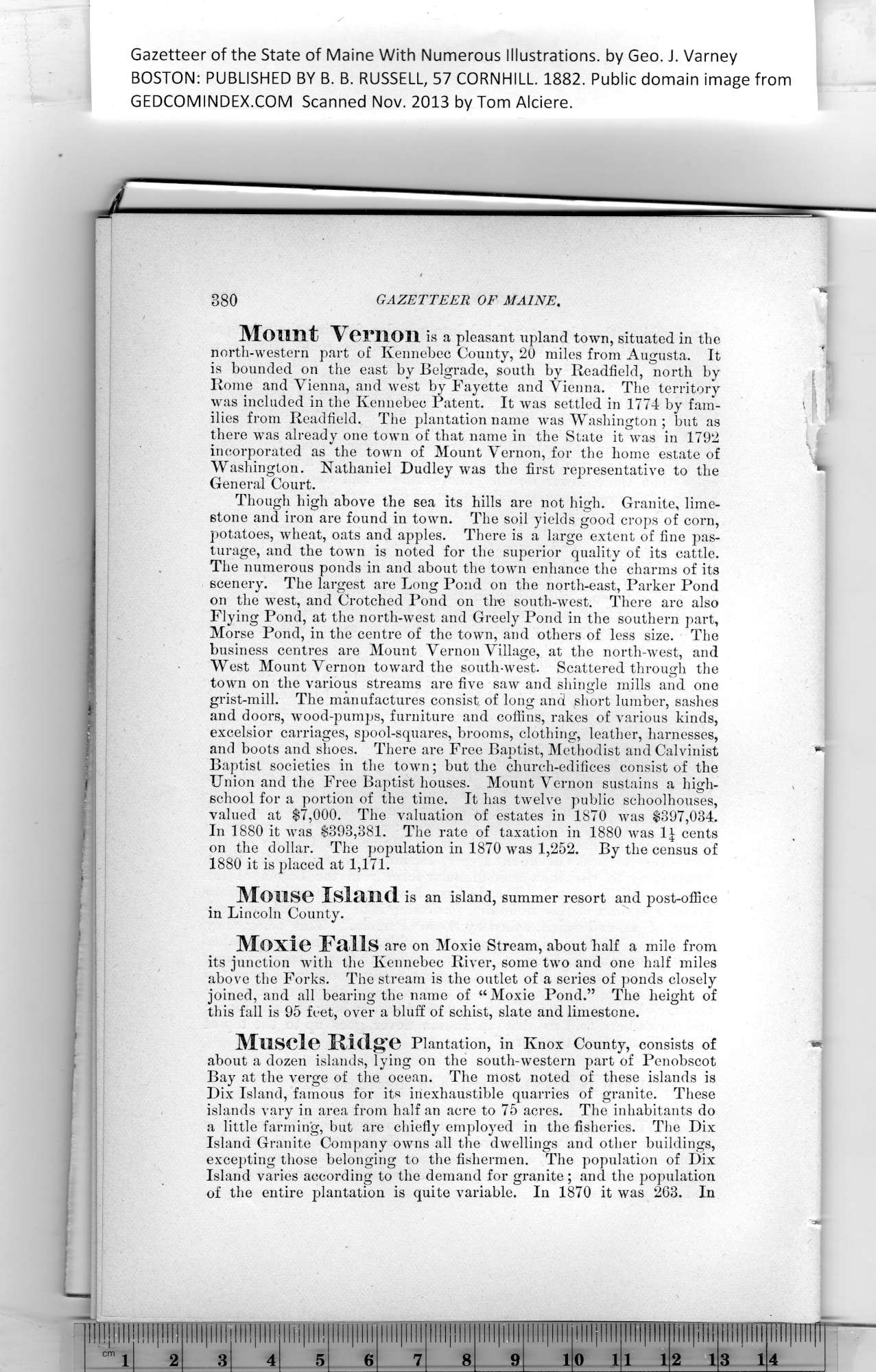|
Gazetteer of the State of Maine With Numerous Illustrations, by Geo. J. Varney
BOSTON: PUBLISHED BY B. B. RUSSELL, 57 CORNHILL. 1882. Public domain image from
880 GAZETTEER OF MAINE.
Mount Vernon is a pleasant upland town, situated in the
north-western part of Kennebec County, 20 miles from Augusta. It
is bounded on the east by Belgrade, south by Readfield, north by
Rome and Vienna, and west by Fayette and Vienna. The territory
was included in the Kennebec Patent. It was settled in 1774 by fam- i
ilies from Readfield. The plantation name wTas Washington ; but as
there was already one town of that name in the State it was in 1792
incorporated as the town of Mount Vernon, for the home estate of
Washington. Nathaniel Dudley was the first representative to the
General Court.
Though high above the sea its hills are not high. Granite, lime-
stone and iron are found in town. The soil yields good crops of corn,
potatoes, wheat, oats and apples. There is a large extent of fine pas-
turage, and the town is noted for the superior quality of its cattle.
The numerous ponds in and about the town enhance the charms of its
scenery. The largest are Long Pond on the north-east, Parker Pond
on the west, and Crotched Pond on the south-west. There are also
Flying Pond, at the north-west and Greely Pond in the southern part,
Morse Pond, in the centre of the town, and others of less size. The
business centres are Mount Vernon Village, at the north-west, and
West Mount Vernon toward the south-west. Scattered through the
town on the various streams are five saw and shingle mills and one
grist-mill. The manufactures consist of long and short lumber, sashes
and doors, wood-pumps, furniture and coffins, rakes of various kinds,
excelsior carriages, spool-squares, brooms, clothing, leather, harnesses,
and boots and shoes. There are Free Baptist, Methodist and Calvinist
Baptist societies in the town; but the church-edifices consist of the
Union and the Free Baptist houses. Mount Vernon sustains a high- *
school for a portion of the time. It has twelve public schoolhouses,
valued at $7,000. The valuation of estates in 1870 was $397,034.
In 1880 it was $393,381. The rate of taxation in 1880 was l£ cents
on the dollar. The population in 1870 was 1,252. By the census of
1880 it is placed at 1,171.
Monse Island is an island, summer resort and post-office
in Lincoln County.
Moxie Falls are on Moxie Stream, about half a mile from
its junction with the Kennebec River, some two and one half miles
above the Forks. The stream is the outlet of a series of ponds closely
joined, and all bearing the name of “Moxie Pond.” The height of
this fall is 95 feet, over a bluff of schist, slate and limestone.
Mnscle Ridgie Plantation, in Knox County, consists of
about a dozen islands, lying on the south-western part of Penobscot
Bay at the verge of the ocean. The most noted of these islands is
Dix Island, famous for its inexhaustible quarries of granite. These
islands vary in area from half an acre to 75 acres. The inhabitants do
a little farming, but are chiefly employed in the fisheries. The Dix
Island Granite Company owns all the dwellings and other buildings,
excepting those belonging to the fishermen. The population of Dix
Island varies according to the demand for granite; and the population
of the entire plantation is quite variable. In 1870 it was 263. In
PREVIOUS PAGE ... NEXT PAGE
This page was written in HTML using a program written in Python 3.2
|
